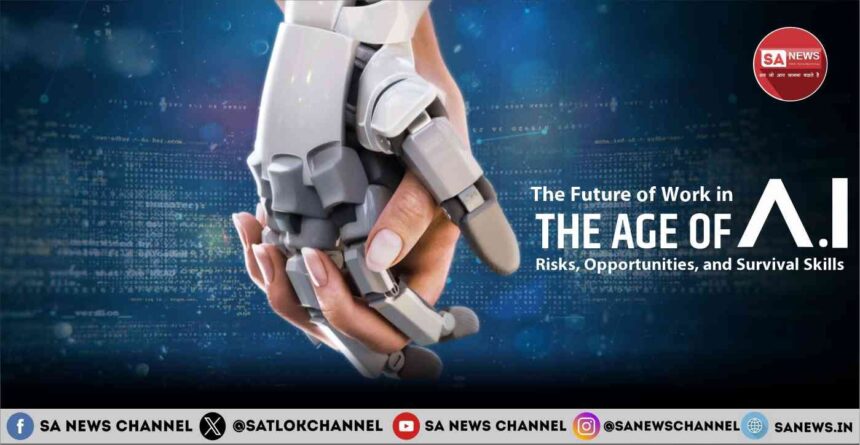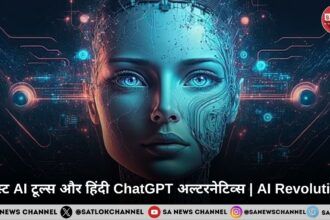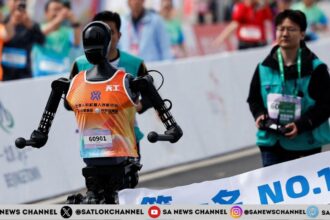We are standing at the dawn of a new era, one where for the first time, we are creating intelligence that operates differently, and in some ways, surpasses our own. We’re standing on the edge of another potential revolution due to the adoption of AI which can fundamentally reshape our world, turning our long-held perspectives on work, creativity, and human value on its head.
- Understanding the AI Boom
- The Shifting Landscape of Work: The Great Reskilling
- The Rise of AI Agents: Your New Digital Coworkers
- Who’s the most vulnerable?
- What does this mean for the people in tech?
- Long Term Impact: Are we heading towards Mass Unemployment or Evolution?
- Who Benefits? Who Gets Left Behind?
- Case Studies for Tech layoffs
- The New Skills Economy: Creative Thinking, Resilience, Adaptability and Agility
- Keeping the Industrial Change Aside: The Purpose of Work
- The Bigger Picture: The Essence of it All
This article explores the heart of this transformation. Are we witnessing a wave of innovation that will unlock unprecedented human potential, or are we architecting a future of mass unemployment? Let’s delve into who’s most at risk, how AI is already changing the game, and whether we’re heading towards a dystopia or a brighter, more evolved tomorrow.
Understanding the AI Boom
A report by IBM in late 2023 stated that nearly 7,800 jobs in the company would be replaced by AI in the coming years. However, they ended up hiring more people for new roles which emerged later on.
Every industrial revolution, from the steam engine to the internet, has caused massive disruption. Jobs were lost, industries vanished, but ultimately, new opportunities bloomed, and society adapted. The current AI surge is no different, but it’s happening at an exponential pace.
Companies are naturally drawn to Generative AI and Machine Learning because they offer incredible efficiency, scalability, and speed, drastically cutting costs and unlocking new capabilities far beyond human limitations.
The Shifting Landscape of Work: The Great Reskilling
As per the World Economic Forum’s Future of Jobs Report 2023, around 170 million new job roles are expected to arise given the current market trends. That sounds promising, but it doesn’t negate the fact that millions of existing jobs are being disrupted, particularly in sectors where tasks can be automated.

(Image Courtesy: World Economic Forum)
A key insight from the report is that 23% of jobs are expected to change significantly in the next five years, with 44% of worker skills needing to be updated. In a nutshell, an average employee will need to re-skill or upskill to stay relevant to the market trends.
We’re entering a transition where being tech-literate is the baseline. The real currency will be our adaptability, our resilience, and our uniquely human creativity.
The Rise of AI Agents: Your New Digital Coworkers
The conversation is already moving beyond simple AI tools that assist with tasks. The next frontier is AI agents which are autonomous systems that can reason, plan, and execute complex, multi-step workflows on their own.
(Image Courtesy: Perplexity’s Comet AI Assistant)
Think of them not as a smarter chatbot, but as a digital coworker. An AI agent could be tasked with “planning a marketing campaign for a new product launch.” It wouldn’t just write copy; it would conduct market research, analyze competitor data, draft a budget, schedule social media posts, and generate a performance report, all with minimal human intervention.
This is a game-changer. While earlier AI automated repetitive tasks like data entry, AI agents can automate entire roles like a project coordinator or a market analyst. This evolution represents a far more profound shift, forcing us to reconsider which human skills remain indispensable.
Who’s the most vulnerable?
Again, not all jobs are equally at risk. However, jobs that don’t require a lot of critical thinking, skillset and involve a lot of repetitive trained work are at a high risk of getting replaced. For instance:
- Data Entry Jobs: This can be automated through the new-age AI tools in no time with much better speed, reliability, and efficiency.
- Customer Support: AI is drastically improving everyday to enhance and match the quality of a skilled customer care executive to assist the customers over chat or over a call.
- Content Creation: Art can be easily replicated with the help of Midjourney and ChatGPT’s Sora Model in no time. One can create simple or complex high-quality graphics for their work in no time with just a single prompt!
- And many more simple job roles like cashier, administrative assistants, accountants, auditors etc. are at great risk of being displaced completely.
What does this mean for the people in tech?
Even the tech industry isn’t immune. Coders who perform simple, repetitive tasks are increasingly at risk as AI-powered tools like GitHub Copilot and Cursor can write, debug, and even build entire applications from natural language prompts.
This has given rise to a phenomenon called “Vibe Coding” where one can build software based on an idea or a “vibe” without needing to understand the deep computer science fundamentals. Let’s dive deeper into this:
The Rise of Vibe Coding
Vibe Coding is reshaping how people perceive programming and building software. With AI coding assistants helping you with the coding through your ideas, you’re just one detailed prompt away from turning your dream projects into reality.
One doesn’t necessarily need to know how to code for bringing your project ideas to life. Creativity and problem-solving are the only factors that can set a person apart from others.
(Image Courtesy: Pendo)
Is this a game changer? Definitely, this has a lot of positives as it breaks you free from the hurdle of learning the deep fundamentals of cs and allows you to freely explore and work on creative projects.
Imagine just being able to converse directly in plain English to present your ideas instead of coding? That idea itself is life saver for many. It lowers the barrier to creating software so people can freely express themselves through their projects.
However, Quoting a line by a prominent physicist Richard Feynman– “What I cannot create, I do not understand.”
Also Read: AI-Proof Careers: In the Age of AI, The Most Valuable Skill Is Still Being Human
Relying solely on AI for coding can lead to a shallow understanding of what’s happening “under the hood.” It discourages the development of core problem-solving and algorithmic thinking skills hence, discourages development of problem-solving and math skills, which matter most in the long run.
These very skills are essential for building complex, scalable, and truly innovative systems. The goal should be to use AI as a powerful copilot to augment our skills, not as a pilot we blindly trust.
Long Term Impact: Are we heading towards Mass Unemployment or Evolution?
This is a double-edged sword. We’re in the middle of another revolution which would completely change how we work.
Researchers spend their time wrestling with training AI models and proposing different ways in which AI might reshape society. These models can think faster, improve productivity, efficiency and can analyze with much greater precision and speed than we ever could!
Now this begs the question, who benefits, and who gets left behind?
Tech entrepreneurs and the companies that build and deploy these systems stand to gain immensely. But low-income workers, older generations less able to reskill, and people in developing regions with limited digital infrastructure face a bleak future.
China’s Dark Factories: AI and Robots take over manufacturing completely
The manufacturing plants of firms like Foxconn in Shanghai, China recently surprised the world with fully automated factories with no human interaction required. Those machines can constantly work with pinpoint precision and accuracy in dark rooms.
While this may sound quite revolutionary, nearly around 123 million people work in manufacturing in China, according to a 2023 survey by the National Bureau of Statistics and that leaves us with a question— Are we heading the right way?
With numerous factory people losing their jobs, these robots are completely replacing human labor which would result in a growing inequality which is quite dystopian to even think of.
Who Benefits? Who Gets Left Behind?
While the AI companies and tech entrepreneurs sitting at the top including the early adopters of AI would highly benefit from this but low-income workers doing repetitive tasks are at risk of being replaced since adapting to this sudden change would be hard.
A big chunk of the older workforce which lacks adaptability and are unable to re-skill would be facing harsh consequences. Also including the people from economically underdeveloped regions with limited exposure and digital infrastructure who’re in a bleak future would suffer.
The greatest risk here isn’t the evolving technology but rather the people who’re entirely excluded and are unable to adapt with it. Those unable to access the tools or the training will be left behind, especially human laborers and those at the bottom layers of the workforce.
Case Studies for Tech layoffs
Major companies are already making strategic shifts:
- Klarna (February 2024): The fintech giant revealed its AI assistant is now handling the work of 700 full-time customer service agents. The AI is more accurate, resolves queries in 2 minutes instead of 11, and has reduced repeat inquiries by 25%.
- UPS (January 2024): The shipping behemoth announced plans to cut 12,000 jobs, citing AI and advanced logistics technologies as key drivers that allow the company to streamline operations while limiting the need for mid-management and back-office employees.
- Chegg (June 2023): The education tech company cut over 4% of its workforce after admitting that ChatGPT was reducing student demand. This highlighted how fast AI can disrupt traditional business models in education.
- IBM (Ongoing): IBM announced a pause in hiring for some 26,000 back-office roles, openly stating that up to 30% of such positions could be automated by AI within five years. However, it continues to expand AI-focused teams, highlighting the dual impact of displacement and job creation.
- Tata Consultancy Services (TCS, mid-2024): While not announcing mass layoffs like Western tech firms, TCS underwent a major restructuring in 2024, reportedly “reprofiling” thousands of employees. The company introduced internal AI-led automation projects that increasingly replaced low-level coding, testing, and support roles. Analysts estimated around 10,000–12,000 staff were rendered redundant due to automation across functions from IT helpdesk to quality assurance, even though many were reassigned or reskilled.
- Cognizant (2023–2024): Cognizant announced workforce reduction plans that would affect approximately 3,500 employees, explicitly citing automation, AI-driven services, and cost optimization. Much like TCS, the focus was on replacing repetitive IT maintenance and BPO services with AI systems.
- Accenture (2023): The consulting giant cut around 19,000 jobs globally, attributing the move partly to restructuring for efficiency through automation and AI deployment. These cuts largely affected HR, back-office, and non-billable functions.
- Google (2024): Alphabet announced significant layoffs in early 2024 across multiple divisions, with AI innovation cited as a double-edged sword. While Google is rapidly expanding its AI teams, several redundant roles in recruiting, ad-tech, and support operations were eliminated, demonstrating how even AI pioneers restructured to align with accelerating automation.
- Amazon (2023–2024): Amazon laid off over 27,000 workers who were partly connected to integrating automation and AI systems in logistics, customer operations, and Alexa divisions. As generative AI tools reshaped its strategy, the company directed resources to cloud and AI innovation, leaving thousands of corporate and warehouse jobs at risk.
The New Skills Economy: Creative Thinking, Resilience, Adaptability and Agility
People should give more emphasis to digital literacy and use AI tools to leverage their workflow instead of letting it overtake us while we spend time in a slump.
So, how do we stay relevant? The key is to lean into what makes us human. Instead of competing with AI on tasks it’s designed to win, we must focus on cultivating skills it cannot easily replicate:
- Critical and Strategic Thinking: The ability to ask the right questions, connect disparate ideas, and formulate long-term strategy.
- Creativity and Innovation: Genuine, out-of-the-box thinking that leads to new products, art, and solutions.
- Emotional Intelligence: Empathy, communication, and collaboration, the skills that build relationships and lead teams.
- Adaptability and Agility: The willingness to continuously learn, unlearn, and relearn is perhaps the single most important skill for the future.
We should use AI as a lever to automate the mundane, freeing up our cognitive bandwidth for the deep, creative, and strategic work that truly drives progress.
Keeping the Industrial Change Aside: The Purpose of Work
The most important question isn’t what AI can do, but what humans will choose to become in a world that no longer needs us to do the work we’ve done for centuries.
We humans have always found meaning in our work– providing something to the society and taking pride in the same. Being connected with the society creatively and spiritually.
This revolution, in its disruption, might offer an unexpected gift: the chance to broaden our definition of a meaningful life beyond the confines of a job title. It may push us to reconnect with our communities, pursue creative passions, and ponder the deeper questions of existence. The questions we’ve often been too busy working to ask.
The Bigger Picture: The Essence of it All
We are living in the 21st century—a time unlike any other in human history. Across the past twenty centuries, mankind has witnessed wars, empires, revolutions, and discoveries, yet never have we seen the kind of transformation in science and technology that we are experiencing today.
Artificial Intelligence, space exploration, genetic engineering—all these breakthroughs seem to have appeared almost suddenly, as if history itself was waiting for this moment. But here lies our greatest misunderstanding: we call these innovations man-made, taking pride in them as our own creation. In truth, they are not merely the fruit of human intellect.
Science itself is a divine gift from Supreme God Kabir—a tool meant to help us recognize Him even in this world governed by illusion (Kaal Brahm). This timing is no accident.
Have you ever wondered why, for countless centuries, humanity couldn’t develop such technologies, despite having brilliant minds in every era? It is because this knowledge was destined to be revealed now, at a time when humanity edges toward destruction, so that we may turn back and realize the true value of God.
As the Holy Geeta Ji declares in Chapter 18, Verse 62, and Chapter 4, Verse 34, ultimate peace and eternal liberation are achieved only by seeking initiation from a Complete Saint.
क्या सृष्टि की रचना के पीछे है कोई दिव्य शक्ति? Srishti Rachna Fully Explained |Creation Of Universe
This is where Saint Rampal Ji Maharaj stands apart. Through his discourses, he has revealed profound, scripturally-backed spiritual knowledge from all religions that brings clarity to questions most of us never got real answers to:
- Who is the Supreme God?
- Why do we suffer, fall sick, and die, even while worshipping?
- What happens after death?
- Can there really be a place free of sorrow, aging, and death?
To fuel your curiosity, make sure to check out: Creation of Universe- By Sant Rampal Ji.
FAQs
1. How is AI reshaping the future of work?
AI is moving beyond automating repetitive tasks to introducing AI agents capable of handling complex, multi-step workflows. This shift threatens certain job roles but also creates new opportunities, requiring workers to adapt through reskilling and focusing on uniquely human skills like creativity and strategic thinking.
2. Which jobs are most vulnerable to AI disruption?
Roles that involve repetitive, predictable tasks are at the highest risk, including data entry, customer support, cashier roles, administrative assistance, and even parts of content creation. In tech, coders doing routine programming work are also vulnerable as AI coding assistants advance.
3. What is “Vibe Coding,” and why is it controversial?
Vibe Coding refers to building software using natural language prompts rather than traditional coding, allowing even non-programmers to create applications. While it lowers barriers to entry, critics warn it discourages deep understanding of computer science fundamentals and problem-solving skills essential for long-term innovation.
4. Who benefits the most from the AI revolution, and who risks being left behind?
Tech entrepreneurs, AI companies, and early adopters are likely to gain significantly. However, low-income workers in repetitive jobs, older generations unable to reskill, and people in underdeveloped regions with limited digital access face exclusion and job displacement.
5. What skills will be most valuable in the age of AI?
The most essential skills are those AI cannot easily replicate—critical and strategic thinking, creativity, emotional intelligence, adaptability, and resilience. Workers who embrace continuous learning and leverage AI as a supportive tool will remain the most competitive.









